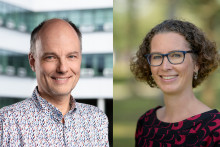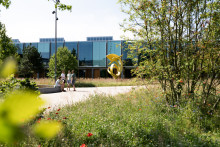Truly deep understanding of language
The main point has to do with teachers' and students' mastery of language. And ultimately in the quality that we can offer students in the education they receive here. Regardless of how well one may speak English, a truly deep understanding of language, proper reasoning, nuances, etc. can and must arise and be nourished from one's own mother tongue. Verbrugge notes that this development takes place primarily in the parental environment and in secondary education. The important question, then, is: ‘Is this enough?’ That is, are students then sufficiently grounded in their understanding of language to complete their education successfully and to be able to play the social role properly that has been dangled in front of them?
Capacity for abstraction
Verbrugge notes that very little structured follow-up is given to students' language development in higher education. However, this must certainly be important for natural sciences and technical programmes! Not simply because so many aspects of the graduates' future jobs hinge on communication, good reporting and persuasiveness. But precisely because substantive depth and the capacity for abstraction go hand-in-hand with the degree to which we can talk and think about that substance and can articulate concepts. Naturally, there are reports and exams, but how often do we correct and discuss and evaluate language skills, the quality of an argument or a story's structure? As a teacher involved in education in the natural sciences, I note that we do a slight bit of all this for the students' bachelor's reports; but hardly at all prior to that. Is this a problem?
An extra hurdle
As long as education takes place in one's own mother tongue, that development does, indeed, proceed implicitly: teachers can use their own language - richer and more developed - and can explain things in more varied ways and with sharper delineation of nuance. Students pick this up and easily learn to formulate in the same manner. And in their products, they can focus more on content and can pay better attention to the structure and composition of their story. At the same time, teachers' feedback on this can be given more rapidly and in greater detail. From personal experience, I know that a story that is poor from a linguistic standpoint is often lacking from the perspective of structure and composition as well. This is rarely because the writer is incapable of producing a good story. It's often because that extra hurdle of its being in a foreign language turns out to be such a complicating factor that, for many, the other aspects of the story suffer as a result.
Fingerspitzengefühl
Even worse, and perhaps the most important argument: by being educated for years in a linguistically impoverished environment (and this is precisely the direction we're headed with our English-language bachelor's degree!), the students' own language development is at a standstill for the entire duration. So it's clearly not the quality of the teachers' and students' English that is at stake here - as is currently being gauged, for example, by the evaluation of English language skills being conducted among UT professors. It's about ‘Fingerspitzengefühl’ or that 'je ne sais quoi' (to use good Dutch), the extra things a teacher brings to the table to help deepen his students' understanding, to provide extra detail and nuance... Those teachers whose mother tongue is English - quite few in number - can never make up for this deficit. That's why the products that students must deliver during their education - and thereafter! - can never be of the same level of quality as those of the current Dutch-language programmes. And that's why the English-language graduate will be a graduate who is poorer in both language and in opportunity.
In short: do the bachelor programmes really all have to be done in English? I have there no words for…
Jurriaan Huskens







